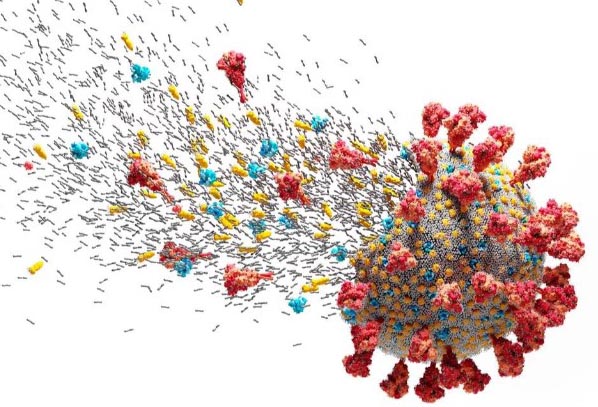New breakthrough in COVID-19 treatment involving a dual inhibitor blocking virus entry
Nikhil Prasad Fact checked by:Thailand Medical News Team Aug 01, 2024 1 year, 6 months, 2 days, 3 hours, 35 minutes ago
COVID-19 News: In an exciting development, scientists from Korea have discovered a promising new compound that could potentially halt the entry of SARS-CoV-2, the virus responsible for COVID-19, into human cells. This
COVID-19 News report will delve into the groundbreaking findings of a study conducted by researchers from Chungnam National University, the Institute for Basic Science, and the Korea Research Institute of Chemical Technology.
 New breakthrough in COVID-19 treatment involving a dual inhibitor blocking virus entry
New breakthrough in COVID-19 treatment involving a dual inhibitor blocking virus entry
The study highlights the identification of UNI418, a dual inhibitor that targets two critical enzymes, PIP5K1C and PIKfyve. This innovative approach offers a new pathway to prevent the virus from infecting human cells.
How SARS-CoV-2 Enters Cells
SARS-CoV-2, like other coronaviruses, enters human cells by binding to the ACE2 receptor on the cell surface. Once attached, the virus undergoes a series of steps including endocytosis (the process of engulfing the virus into the cell) and membrane fusion, which ultimately releases the viral genome into the host cell, leading to infection. A crucial part of this process is the cleavage of the virus's spike protein by the host cell's enzymes, which facilitates the fusion of the viral and cellular membranes.
The Role of PIP5K1C and PIKfyve
The enzymes PIP5K1C and PIKfyve play essential roles in the cellular processes that SARS-CoV-2 exploits to enter cells. PIKfyve is involved in the regulation of cathepsins, enzymes that activate the spike protein of the virus. Meanwhile, PIP5K1C is crucial for the endocytosis of the virus through its interaction with the ACE2 receptor. By inhibiting these enzymes, UNI418 can block the virus's entry into the cells at multiple stages.
Key Findings of the Study
The study demonstrated that UNI418 effectively inhibits the proteolytic activation of cathepsins, preventing the cleavage of the SARS-CoV-2 spike protein. This blockade is crucial because without this cleavage, the virus cannot escape the endosome and enter the cell's cytoplasm. Additionally, UNI418 was shown to inhibit the endocytosis of the virus, further preventing it from entering the cells.
Inhibition of Spike Protein Cleavage
Researchers observed that UNI418 delayed the cleavage of the spike protein, which is necessary for the virus to fuse with the cell membrane. This delay disrupts the virus's ability to release its genetic material into the host cell, thereby stopping the infection process.
Preventing Endocytosis
UNI418 was also found to inhibit the ACE2-mediated endocytosis of the virus. By targeting PIP5K1C, the compound blocks the virus from being engulfed into the host cell. This dual mechanism of action - preventing both the entry and the activation of the virus - makes UNI418 a highly effective potential antiviral agent.
t;
Implications for COVID-19 Treatment
The discovery of UNI418 opens up new avenues for treating COVID-19, especially for severe cases where existing treatments may not be sufficient. By targeting the virus's entry mechanism, UNI418 could complement existing antiviral drugs and vaccines, offering an additional layer of protection against SARS-CoV-2.
Further Research and Development
While the initial results are promising, further research is needed to fully understand the potential of UNI418. Clinical trials will be essential to determine its safety and efficacy in humans. If successful, UNI418 could become a vital tool in the fight against COVID-19 and other emerging viral diseases.
Conclusion
The findings of this study represent a significant step forward in the search for effective treatments against SARS-CoV-2. By inhibiting key enzymes involved in the virus's entry into cells, UNI418 offers a novel and promising approach to combating COVID-19.
The study findings were published in the peer-reviewed journal Experimental & Molecular Medicine.
https://link.springer.com/article/10.1038/s12276-024-01283-2
For the latest
COVID-19 News, keep on logging to Thailand Medical News.
Read Also:
https://www.thailandmedical.news/news/sars-cov-2-kp-variants-seems-to-be-evolving-towards-causing-chronic-infections-kp-3-3-with-orf1a-i1367l-debuts-in-europe
https://www.thailandmedical.news/news/one-third-of-all-exposed-to-covid-19-likely-to-develop-cerebral-microbleeds
